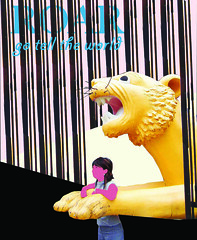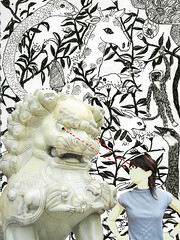
go tell the world! - photo take in Little India by J, remixed by Y
Unlike J, I am not terribly fond of Rojak - a dish of deep-fried dough and dried tofu, boiled bean sprouts and pieces of cucumber, pineapple, turnip and green mango, mixed together with a gluey black prawn paste and topped with chopped peanuts.
But it was hard to refuse L&G and Tym's invite to this event, named after the dish. For one thing, it was held at a place along Starlight Road, somewhere in Little India...and how bad can someplace called Starlight Road be?. Of course, the event also promised to feature presentations by 10 artists, illustrators, designers and architects. Since J and I are always curious about seeing the stuff others do, we trooped down to Little India for the 3rd time this past week.
True to its name, the range of work spanned from the political to the personal; the prosaic to the elusive; the naive to the sophisticated. So what went into this rojak? There was Zixi's absolutely charming illustrated book, G's ingenious jewelery, the clever design of some public stands for the Merlion Park and several short films etc.
But the extremes are always the most memorable. For me, on one end of the works was Alfian Sa'at and Nicholas Li's performance piece on political videos - smart, knowing, incisive but, perhaps, unforgiving in its tone and spirit. This, I suppose, is because its subject - the use and intent of the Political Films Act - is equally unforgiving to those it censors and censures. His was a work the crowd clearly sympathised(?) with. On the other end, I found L's "Memory Units" - personal, liberating in both its form and spirit, but elliptical. I think it lost some of the crowd in its Alice-in-Wonderland pursuit [I've tried to describe the work in the postscript below! A recipe for making memory units.].

a staring match with tradition - photo taken in Little India by J, remixed by Y
I am thinking of the preface to a collection of Eileen Chang/Zhang Ailing's San Wen (short essays, 白or literally "scattered prose"), in which the editor described the early responses to this Chinese literary form. Giants like Lu Xun made the San Wen a powerful tool for societal and political change. And Lu Xun was also critical of writers who used the San Wen as a form of personal reflection and leisurely consumption. But the SanWen today is a highly diverse form - and no one prescription suffices, not even one by Lu Xun.
And in some ways, seeing all 10 10-minute presentations at Rojak is like reading 10 San wen by 10 different writers. So I thought to borrow the conclusion of that preface:
艺术是独立的,散文是个性的
(trans: art is always independent, the San Wen/Short essay is always unique/individual.)
The next Rojak is in March 2006. To find out how to take part in it, click here
____________
postscript
L's "Memory Units" to me is an experiment in uncovering memory and making what is intangible, ineffable into something material, discrete, literal and with form. And then freeing that physical form back into abstraction. (L, sorry if what I describe is far from what you intend!)
(1) Choose an object that means something special to you. For L, it was a music box.
(2) Each time you encounter the object (e.g. each time L opened the music box...), draw immediately what you are reminded of on a large piece of paper. Repeat this step until the entire sheet of paper is filled up.
(3) Imagine the cross section of each object you have drawn. Construct that cross-section in miniature. Insert in each cross-section the drawing of the object itself. Wrap each construct in paper and put it in a bag. Voila! Quite literally, you have memory you can uncover and carry with you.
(4) When you are happy with this whole project, take out each cross-section construct from the bag, and its paper wrapping.
(5) Piece all of them together to form one large object.
(6) Using an overhead-projector, cast the shadow of this object on the wall.
(7) Make drawings or take photographs of the shadow.
(8) Create a montage from these photographs or drawings
You know...this process can go on and on forever. But after this methodical and hectic madness, it left me conscious of something that stays incredibly still - the moment before memory gets locked into being an image in Step 1. Amidst all the busy-ness to capture, transform, understand, play and investigate memory, that was the one thing that mattered.






No comments:
Post a Comment